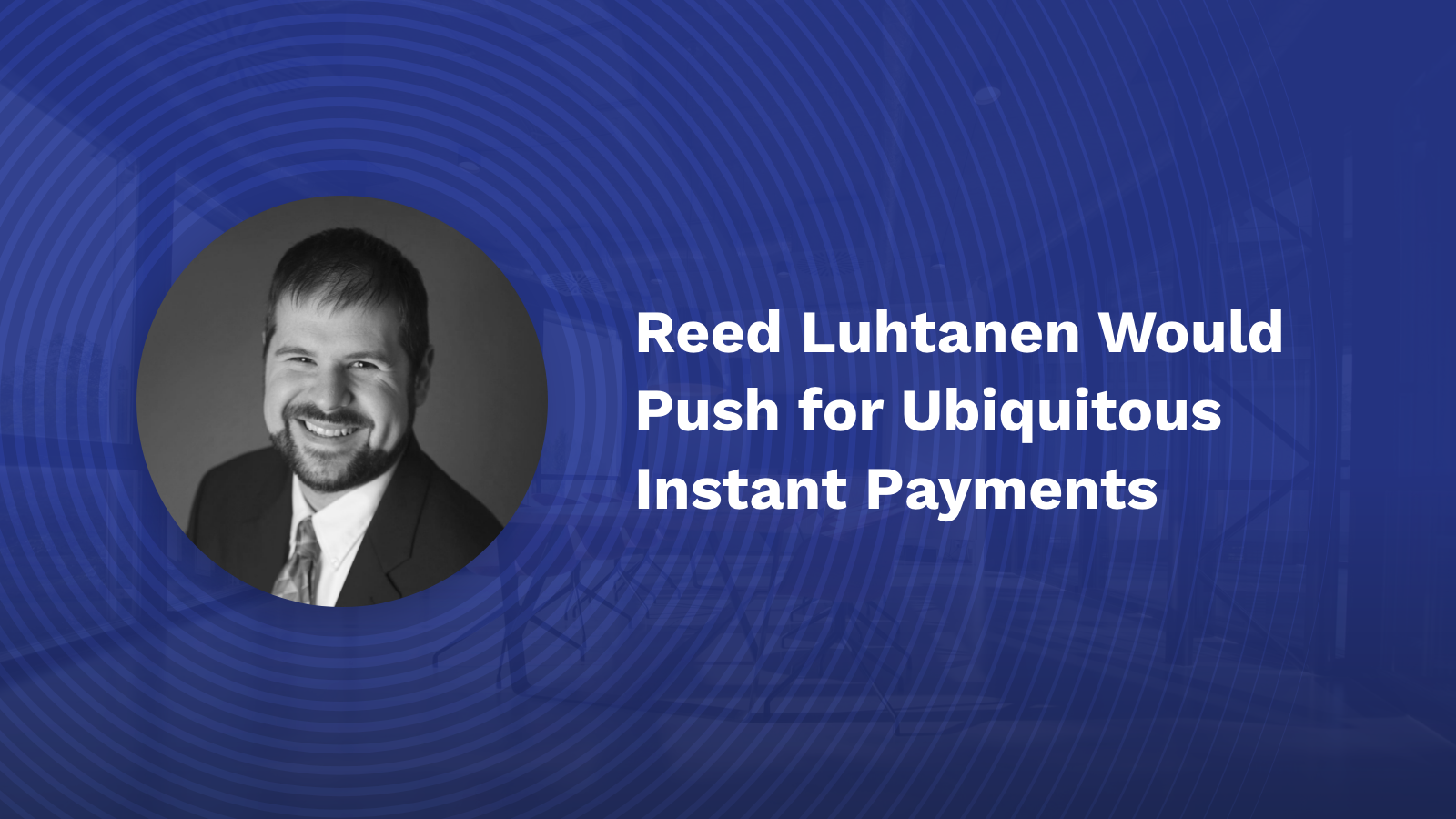
Reed Luhtanen Would Push for Ubiquitous Instant Payments
Reed Luhtanen is Executive Director of the U.S. Faster Payments Council (FPC). Reed has extensive experience in the payments industry and has served on myriad industry bodies, most recently an officer on the FPC Board of Directors; the Federal Reserve-sponsored Governance Framework Formation Team, which created the U.S. Faster Payments Council; and the Corporate Advisory Group for The Clearing House’s Real-Time Payments System.
Reed Luhtanen joined FISPAN’s Clayton Weir on the If I Ran the Bank Podcast, where they discussed the US Faster Payments Council and how they are working towards a future of ubiquitous instant payments.
US Faster Payments Council (FPC)
“The FPC is an industry-led member organization, whose mission is to facilitate a world-class payment system where Americans can safely and securely pay anyone anytime, anywhere with near-immediate funds availability,” said Luhtanen. Unlike other trade associations or industry organizations, which are generally assembled around a particular industry vertical, the FPC was created around an idea; “ubiquitous, safe, easy to use, faster payments are going to benefit all of us.”
The FPC brings together the different facets of the payments ecosystem, including:
- Business end-users including Walmart, Netflix, Microsoft and Airbnb
- Consumer organizations, including National Consumer Law Center
- Financial institutions of various sizes including J.P. Morgan Chase and Citi
- Credit unions
- Payment network operators including Visa, the Clearing House, the Federal Reserve
- Technology providers including Fiserv, ACI Worldwide
- Startups and innovators
- Others (trade associations, consultancies, law firms, etc.)
“We’re doing something for the first time in 50-60 years, in that we’re rebuilding the payments infrastructure of the world’s most complicated and complex economy”, said Luhtanen.
Members can be a part of the conversation, receive information, and influence the outcome so their interests are represented. The narrow focus of the FPC creates a rich dialogue on faster payments becoming the mainstream focus of the United States payments ecosystem.
Much of the FPC’s focus is around how information is exchanged between the sender and receiver, and how to ensure both parties have transparency. Largely the focus is on speed and the data layer associated with ISO 20022 messaging, which can add value to all users.
What Are Faster Payments?
“We have a broad view of what a faster payment is”, Luhtanen said. FPC considers a faster payment to be a real-time payment, using what the International Bank of Settlement has defined as fast payments:
Fast payments can be defined by two key features: speed and continuous service availability. Based on these features, fast payments can be defined as payments in which the transmission of the payment message and the availability of final funds to the payee occur in real-time or near-real-time and on as near to a 24-hour and 7-day (24/7) basis as possible.
You can read the full definition here.
The Future of Faster Payments
Luhtanen would like to see a future where it’s possible for every demand deposit account (DDA) in the United States to reach every other DDA in a way that allows for immediate or instant transactions. Ideally, this would be in a way that ensures you’re not compromising the structural integrity of the payment system and that there is education in place to ensure there is an understanding of the difference between these payments and other electronic payments from the past. In addition, ease of use and scalability for these payment networks would be a priority.
Three to four years ago, members of the Federal Reserve’s Governance Framework Formation Team (GFFT) had hoped to see ubiquitous instant payments by 2020. That goal was not met, and right now, Luhtanen said “the percentage of DDAs that are connected to The Clearing House’s real-time payments network is now over 70%.” Luhtanen stated they hadn’t known how complex the task was going to be, especially for financial institutions.
Despite complexities, “there’s a lot of activity happening in this space and a lot of growth”, Luhtanen said. The percentage of DDAs that can receive has grown significantly over the last few quarters. Card networks like Visa and MasterCard are already connected to almost 100% of the DDA. A company like Zelle, which is a messaging service that leverages various payment networks, is also able to reach almost 100% of accounts with the various relationships they have.
Why Should Financial Institutions Get Involved?
You’re either a follower or a leader, and being a leader in the financial industry means being out in front and learning from early implementations and investing in the future of transactions.
“There are very real threats to financial institutions that continue to emerge in the FinTech space”, said Luhtanen. Many of these new companies are asking how they can make payments easier, more intuitive, and simpler for customers. Banks are well-positioned to offer these solutions to their customers and keep themselves and their brand front and center.
Banks who get involved on the journey to ubiquitous instant payments will ensure that their customers continue to choose them for their financial operations and needs. Luhtanen noted that banks can create a competitive advantage for themselves by driving customers to seek a bank that is connected to the RTP network.
__
Dive in further with Reed Luhtanen on the full episode of the If I Ran the Bank podcast on Apple Podcasts, Spotify, Google Podcasts, Amazon Music or by visiting the If I Ran the Bank website.



